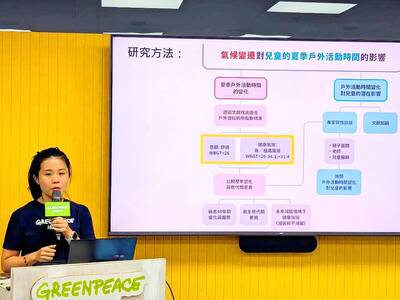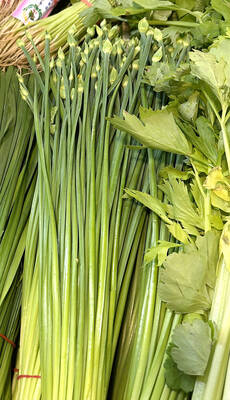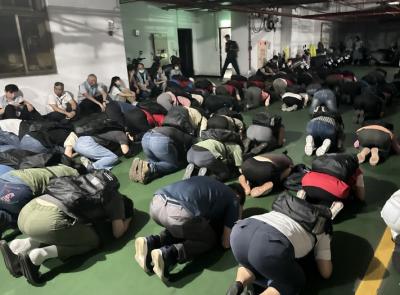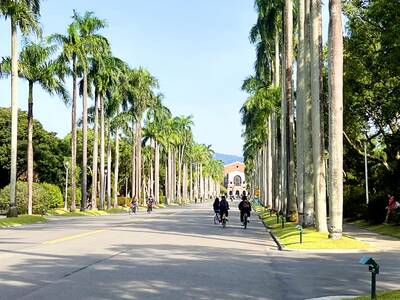An eastbound train was slightly delayed at the Yilan Railway Station after a large snake was found in one of the train carriages, the Taiwan Railways Administration (TRA) said yesterday.
The Tze-Chiang Express train No. 272 departed from the Miaoli Railway Station at 5:27am headed for Hualien, the agency said.
At 8:19am, just after the train passed the Ruifang Station (瑞芳) in New Taipei City, passengers informed the conductor that a 1m-long snake was coiled on a handrail in the 12th carriage, the agency said.

Photo: Chiang Chih-hsiung, Taipei Times
The conductor notified the operation control center and evacuated the passengers to other carriages before closing the carriage, it said.
Yilan County Fire Bureau officials went aboard and caught the snake when the train made a stop at the Yilan Railway Station at 9:25am, the agency said, adding that it was a non-venomous pet snake.
The agency said it is investigating whether the snake climbed onto the train by itself or a passengers brought it onboard.
“We ask all passengers to follow regulations when traveling with their pets to avoid disturbing other passengers,” the agency said.
The Forestry Bureau said the snake is a red-tailed boa, whose natural habitat is in Central and South America.
Its distinct features include a bulky body and a large triangular head, the bureau said.
Article 46 of the TRA’s Passenger Transport Contract states that passengers should not bring snakes into the station, out of the station or onto trains, the railway agency said.
Passengers who bring animals into a railway station or onto a train carriage without permission or refuse to follow the instructions of station personnel regarding pets can be fined NT$1,500 to NT$7,500, it said.

The government should improve children’s outdoor spaces and accelerate carbon reduction programs, as the risk of heat-related injury due to high summer temperatures rises each year, Greenpeace told a news conference yesterday. Greenpeace examined summer temperatures in Taipei, New Taipei City, Taoyuan, Hsinchu City, Taichung, Tainan and Kaohsiung to determine the effects of high temperatures and climate change on children’s outdoor activities, citing data garnered by China Medical University, which defines a wet-bulb globe temperature (WBGT) of 29°C or higher as posing the risk of heat-related injury. According to the Central Weather Administration, WBGT, commonly referred to as the heat index, estimates

The Taipei Department of Health’s latest inspection of fresh fruit and vegetables sold in local markets revealed a 25 percent failure rate, with most contraventions involving excessive pesticide residues, while two durians were also found to contain heavy metal cadmium at levels exceeding safety limits. Health Food and Drug Division Director Lin Kuan-chen (林冠蓁) yesterday said the agency routinely conducts inspections of fresh produce sold at traditional markets, supermarkets, hypermarkets, retail outlets and restaurants, testing for pesticide residues and other harmful substances. In its most recent inspection, conducted in May, the department randomly collected 52 samples from various locations, with testing showing

Taipei and other northern cities are to host air-raid drills from 1:30pm to 2pm tomorrow as part of urban resilience drills held alongside the Han Kuang exercises, Taiwan’s largest annual military exercises. Taipei, New Taipei City, Keelung, Taoyuan, Yilan County, Hsinchu City and Hsinchu County are to hold the annual Wanan air defense exercise tomorrow, following similar drills held in central and southern Taiwan yesterday and today respectively. The Taipei Mass Rapid Transit (MRT) and Maokong Gondola are to run as usual, although stations and passenger parking lots would have an “entry only, no exit” policy once air raid sirens sound, Taipei

Taipei placed 14th in the Quacquarelli Symonds (QS) Best Student Cities 2026 list, its highest ever, according to results released yesterday. With an overall score of 89.1, the city climbed 12 places from the previous year, surpassing its previous best ranking of 17th in 2019. Taipei is “one of Asia’s leading higher-education hubs,” with strong employer activity scores and students “enjoying their experience of the city and often keen to stay after graduation,” a QS staff writer said. In addition to Taipei, Hsinchu (71st), Tainan (92nd), Taichung (113th) and Taoyuan (130th) also made QS’ list of the top 150 student cities. Hsinchu showed the